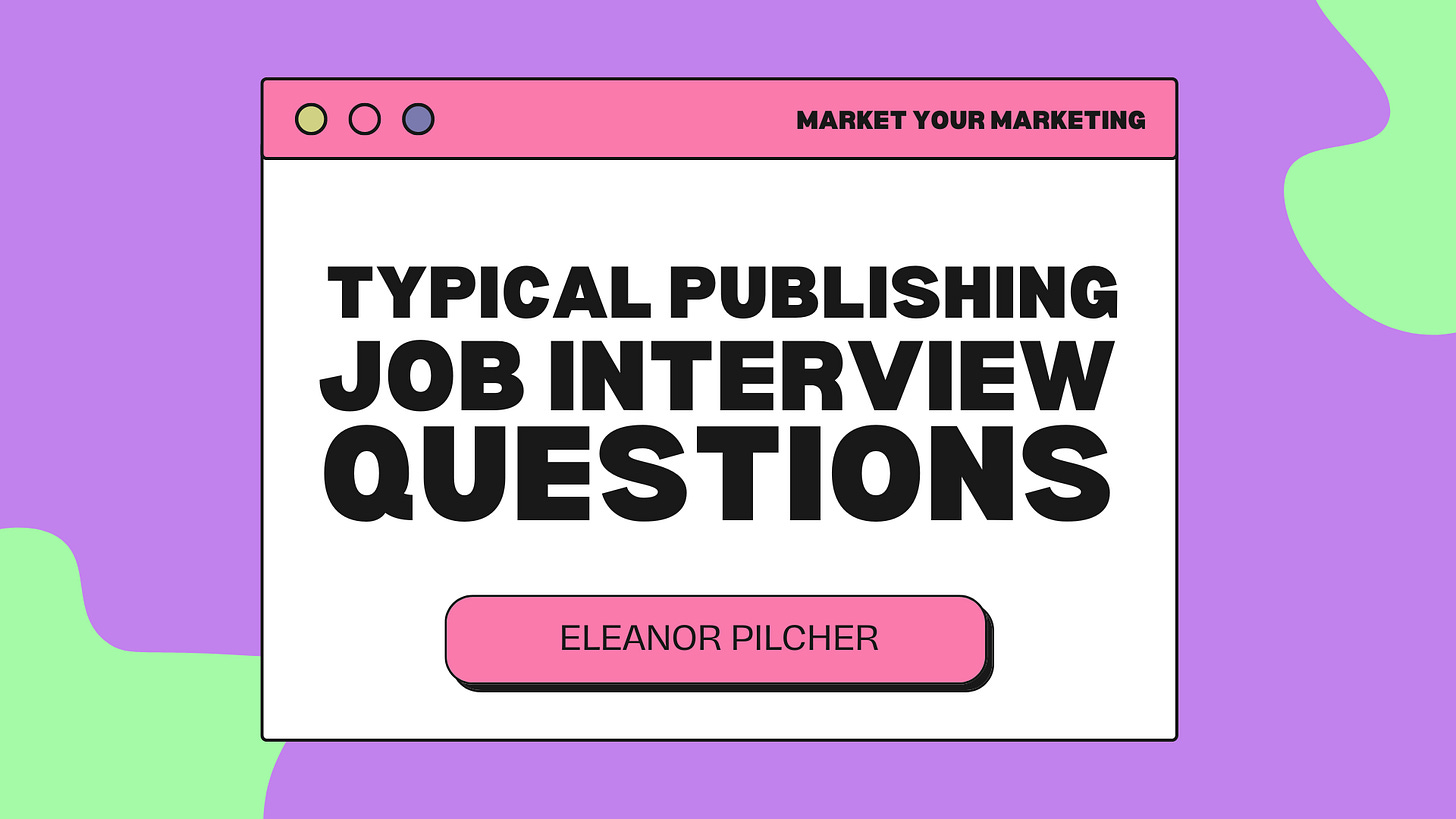Typical publishing job interview questions
What will you be asked in a publishing job interview? These are some of the most commonly questions you will face, with tips on how to approach answering them.
If you have an interview within the publishing industry coming up I suspect you will be asked at least one of the eight questions below.
To help, I’ve shared what I look for in an answer to these common questions, as someone who has interviewed well over 30 people for 10+ jobs within publishing, from interns to Heads of roles.
Can you tell us about your career and experience to date?
This is usually how every interview starts. Apart from CVs, cover letters, maybe a Q&A and a glance at your social media, we don’t know much about you. So fill us in.
Be positive about your experiences, where possible, and expand on how they helped you grow as a publisher. What did you learn at your previous job, be it publishing-based or not? Have you got management experience, managed any budgets or finances, or taken any courses to develop your skills? What did you like most about your previous roles and what are you looking to develop after leaving?
What motivates you?
Are you a driven self-starter? Are you motivated by success? Do you love collaborating with people - honestly? I love asking this question as I get a different answer from every person.
Be honest. That is my top advice. If you love working independently, don’t be afraid to say so. Explain why, and if teamwork is part of this new role talk about how you will marry up independent working with collaborating in a team. If you’re data-driven, expand on this and tell us how you’ve used data in the past to inform your ideas.
We can see passion when people are honest about their motivations, so being honest will help with this answer.
What would you say is your biggest strength/weakness?
Another very common question is finding out your strengths and weaknesses. Once again, have some in mind before your interview and expand on them.
Everyone has at least one weakness - often more - and that’s fine.
If your weakness is something you’re looking to improve explain how you’re going to improve on it if you’re offered this new position. If it’s a weakness that could also be a strength i.e. my weakness is I say yes to a lot, as I want to help my team as much as possible and learn new things, I always expand on this. For example, I recognise that saying yes to everything puts pressure on my time and resources, so I’m improving my delegation and time management skills to ensure I’m performing at the highest standard.
Your strengths are easier to talk about, but make sure you include an example of whatever you say. For example, if your strength is 'brilliant communication skills’, share an example of when you had to communicate effectively, how you did it and what happened. It can be brief, but always share evidence of your abilities.
Can you give us an example of when you used your initiative?
Publishers love to hear about when we use initiative. It’s another way of asking ‘What can you bring to this company’. Whether you work in publishing or not, you can talk about an experience you had at a previous job, at university or within a side hustle.
Make sure you include what you did, how you did, any challenges you faced and the results. Just saying ‘I did it X’ is not enough. We want to see how you used your initiative and what it led to.
Why do you want to work for this company?
Make sure you do your research, however basic, before an interview, into the company you’re applying to work at. Who are their top authors? What’s their biggest book of the year? What type of books do they publish, or not publish as the case may be?
From that research determine why you want to work there. Is it the chance to work on non-fiction titles that interest you? Do you love romance and really want to work with some big-name authors, or build new authors in the genre? Are you a huge audiobook fan and love the company’s audio-focused campaigns?
Find at least one thing that you like about the company and expand on that in your interview.
Which of the authors on our list are you most excited to work with?
This is not a trick question to see how well you’ve prepared, but it can be very telling to an interviewer if you can’t answer this question.
Review the publisher’s socials or websites to see their author list and determine the author(s) you’re most excited to work on. It can be an established author, a debut or a celebrity, have one in mind and expand on what it is that excites you. Is it the high-profile nature of the author? Have you previously read an author’s books and love the idea of working with them on one? Do you love the sound of an author’s upcoming book?
We want you to want to work with us, and this question is just to ensure you truly do.
What campaigns have you seen/have impressed you recently?
This is the question I see the most slip-ups on, within publicity and marketing interviews especially. So many people reference campaigns or books from 5+ years ago when I want to see how much current market awareness a prospective employee has.
Before an interview make note of at least one book that has been released in the last twelve months that caught your eye. It could have been making a splash on TikTok and was only £3.50 in The Works or has over 20,000 reviews on Amazon and is being talked about at festivals and on Between the Covers on BBC. Why did it catch your eye? How many times did you see it? Have you read it as a result of seeing it? You don’t have to like the book, you just need to explain why it was or is impactful in the market.
What books do you like to read?
And finally, this is often one of the last questions I ask potential employees. It’s not a trick question, and you can be honest and say you’re reading a non-fiction cookery book if you’re applying for a children’s fiction role. It doesn’t matter. We want to know who you are with this question.
Personally, I’m always suspicious if someone says they’re currently reading one of the books from the company they’re interviewing for. If you are reading one, then absolutely fine. But if you do say that I will quiz you on the plot and if you say ‘I’ve just started’ it’s very telling, so be honest and be yourself.
If you have any requests for further publishing tips and tricks let me know in the comments below.





